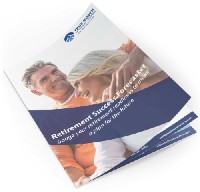
We separate the relevant from the noise, to bring you timely content that helps you on the path to and through retirement!
This month’s newsletter starts off with an update on the economy and the stock market. We then move on to how you can protect yourself against elder abuse, living a fulfilled retirement, and a discussion of real estate (possible 2005 bubble all over again?). Finally, we wrap up with some tips on keeping your accounts safe with one important rule of thumb.
State of the Markets – S&P 500: 2,779.03 (+3.9% YTD through 6/8/18)
The economy is gaining steam. In fact, the Atlanta Federal Reserve is now forecasting 4.6% GDP growth in the second quarter. That is more than double the rate of growth in 2017 and well above the 2.2% growth rate in the first quarter. Unemployment is at its lowest level in 18 years. And, for the first time ever, there are more job openings (6.7 million) than unemployed (6.3 million).
U.S. household net worth just hit a record $100 trillion and earnings growth for 2018 is expected to exceed 20% (1).
The biggest risk to the stock market is a recession, but we see no signs of a recession anytime soon. Byron Wien, a leading market analyst and Vice Chairman at Blackstone, said he doesn’t see a recession until at least 2021. He says, “leading indicators are still expanding, earnings are still increasing, unemployment is low, but inflation is also low. Maybe some of these things are going to change abruptly and the yield curve is going to invert, but right now I see this cycle going on for a couple of more years. And, as long as that is the case, I think volatility will remain low. There’ll be 10% corrections along the way but I don’t think anything more severe than that” (2).
Small-cap stocks appear to be the best place to invest so far in 2018. According to USA Today, the Russell 2000 Index is up over 9% so far this year compared to 3.6% for the S&P 500 Index. According to the SBBI Yearbook, small-cap stocks have returned 12.1% per year from 1926-2017 compared with 10.2% for large-cap stocks (3). We continue to like small-cap stocks as a way of diversifying away from some of the large technology companies that have dominated the indexes over the last five years.
In addition, the new tax law should help smaller companies disproportionately (compared to large multi-nationals), because of increased domestic demand and the lower 21% tax rate on revenues domestically.
Are You Protected Against Elder Abuse?
Over the last decade, we have encountered several situations where elderly clients start to lose their cognitive skills (i.e. memory loss, reasoning, processing information, attention span, motor skills, etc.).
We had one client who was with us for over 25 years who started to become agitated, because she thought her dividend and interest income was missing. She was very confused and upset no matter what we said or what showed her to the contrary. The client continued to contact us, very upset about her missing income, and completely unaware that we had already tried to resolve this issue with her several times already.
What made the situation worse was that there was no family or trusted individuals who could step in to help her manage her finances. In other words, she didn’t have a backup plan for when she inevitably became unable to manage her finances.
Aging individuals want to keep their independence and are quick to minimize difficulties. While adult children are reluctant to meddle and may even ignore red flags. Consequently, everyone waits. However, by waiting, the consequences can be dire: closed accounts, damaged credit, money lost to scam artists, and even foreclosure.
Often, when clients show signs of dementia or cognitive decline, it opens the door to financial abuse from friends, neighbors, and family members. As financial advisors, we are often powerless to help unless the client has taken steps to prepare for the situation.
There are several ways you can protect yourself against elder abuse as you age:
- Select at least 1 person who you trust and who will look out for your best interest and let them decide when the time has come for you to hand over the reins.
- Be sure that your estate plan includes a power of attorney, which allows you to appoint someone to manage your affairs if you are unable to do so yourself.
- Add a “Trusted Contact” to your True North accounts. This will allow us to reach out to your trusted contact if we become concerned or see major red flags in your decisions and behaviors. It’s easy to set up and a great first step! Call us for more info.
Above all, don’t wait. Power of attorneys, etc. are only valid if you are mentally competent when you sign the document, so if you wait too long, you may pass the point of no return, creating a real mess for yourself and your family, and making yourself vulnerable to abuse from others.
5 Ways to Live A Fulfilled Retirement
About 15 years ago, we hosted a client event about transitioning into retirement. At this seminar, our featured speaker was a psychologist who provided the following tips to our clients (4). We have seen an uptick in clients retiring recently, so we wanted to resurrect this timeless advice:
- Have at least one-half of your time organized. This provides structure and a predictable flow to your days.
- Think of your life from the end looking backward. What did you do that was rewarding, meaningful, and fulfilling? Then, go out and do those things – NOW!
- New friendships, social contacts, or volunteer work needs to be established to make up for lost interactions at work. Otherwise, boredom, or worse depression, may set in.
- If you’re married, be considerate of your spouse. Now that you are home more often, don’t drive your spouse crazy by monopolizing their time or tagging along everywhere he/she goes. Give your spouse the space he or she needs.
- According to Margaret Altmix, president of “My Plan After 50”, a website for baby boomers, “the most important factor in a successful retirement is the strength of your social network. It is much more important than health and wealth.”
Is this a 2005 Real Estate Bubble All Over Again?
According to the American Enterprise Institute, since mid-2012, real home prices have increased by 28% while the growth of entry-level home prices has doubled that (5)! With incomes growing in-line with inflation (which has been very low), houses are becoming increasingly unaffordable. Over the long haul, real estate values cannot exceed increases in income for very long.
While we don’t believe real estate is in a bubble yet, we are starting to see signs that can lead to a bubble – loose mortgage terms, speculation by inexperienced investors, property flipping, easier credit, and excessive use of leverage.
Why You Should Always Assume That Someone Else Is Reading Your Emails
When sending emails, it’s always important to remember that your email is not secure. Always assume that someone else can or is already reading your emails. Making this assumption will help you be extra careful when sending potentially sensitive information to others via email.
We have some tips for you to keep your information and your accounts safe:
- Never include account numbers, social security numbers, etc. in your emails. It’s best to use the last 4 digits of your account number instead.
- Never attach account statements (i.e. brokerage, bank, etc.) to your emails. Most often, your full account number is listed on your statement. If you would like to send a secure document, please call our office and we will send you a link to a secure folder where you can upload your document.
- Don’t open links or attachments in your emails from unknown senders.
Citations:
- Aurelio, David & Dhillon, Tajinder. “S&P 500 Earnings Scorecard” Thomson Reuters, 6 June 2018.
- Lovelace, Jr., Berkeley. “Wall Street Veteran Byron Wien Doesn’t See a Recession Until at Least 2021” CNBC, 7 June 2018. cnbc.com/2018/06/07/blackstone-byron-wien-does-not-see-an-economic-recession-until-at-least-2021.html
- Shell, Adam. “Small Stocks Can Add Up to Big Gains” USA Today, 7 June 2018.
- Dr. Rod Landes “Living A Happy and Successful Retirement” The Wall Street Journal
- Kupiec, Paul & Pinto, Edward. “The Government Creates Another Housing Bubble” Wall Street Journal, 1 June 2018.



